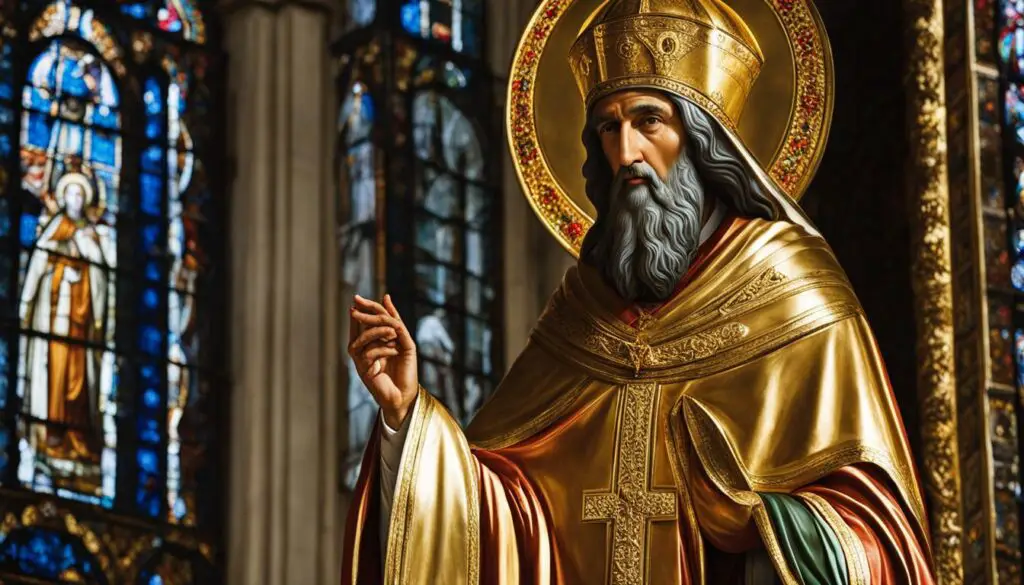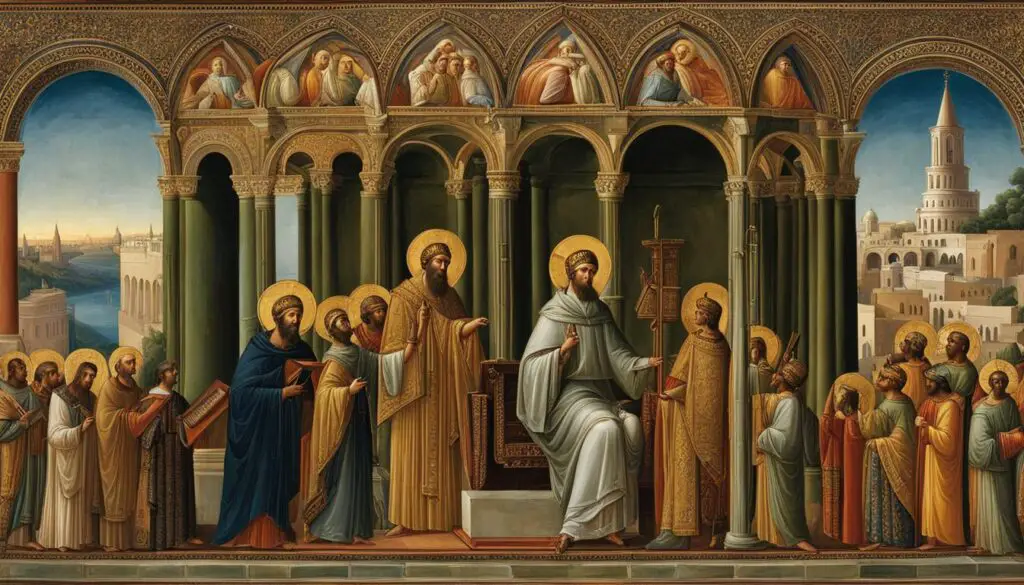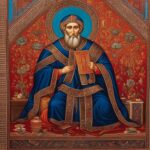St. Theophilus of Alexandria was an early Christian theologian and Church Father who left a profound impact on the development of Christian thought. As a biblical scholar and a Christian apologist, his writings and teachings continue to inspire and guide Christians today.
Born in Alexandria, one of the most influential cities in the early Christian world, St. Theophilus came from a wealthy and influential family. His comprehensive education in Greek philosophy, literature, and theology prepared him for a life dedicated to religious pursuit.
It was during his early years that St. Theophilus felt a calling to devote himself to religious life. After a deep conversion experience, he fully embraced Christianity and embarked on a journey of study, writing, and ministry.
Throughout his life, St. Theophilus produced numerous theological treatises, commentaries on Scripture, and apologetic writings. His works reflected a unique blend of Greek philosophy and Christian thought, as he sought to harmonize these two disciplines in his exploration of the truths of the faith.
While St. Theophilus’s contributions were widely recognized and admired, he also faced challenges and criticisms. Engaging in theological controversies and debates with other Christian scholars, he defended his ideas and interpretations with conviction.
St. Theophilus’s scholarly accomplishments earned him recognition and honors during his lifetime. His expertise and insights made him one of the preeminent theologians and apologists of his time.
Believed to have performed miracles, St. Theophilus’s holy reputation grew after his death. He was venerated as a saint, and his tomb became a place of pilgrimage for those seeking his intercession and blessings.
The legacy of St. Theophilus of Alexandria lives on in the world of Christian theology. His writings and teachings continue to be studied and referenced by scholars and theologians, influencing the development of Christian thought. Today, he is revered as a saint, with his life serving as an inspiration and source of guidance for Christians worldwide.
Key Takeaways:
- St. Theophilus of Alexandria was an early Christian theologian, Church Father, and biblical scholar.
- He sought to harmonize Greek philosophy and Christian thought in his writings and teachings.
- St. Theophilus’s scholarly contributions earned him recognition and honors during his lifetime.
- After his death, he was venerated as a saint, known for performing miracles and his holy reputation.
- His legacy continues to influence Christian theology and serves as a source of inspiration for believers.
Early Life and Background
In this section, we delve into the early life and background of St. Theophilus of Alexandria, shedding light on the formative years that shaped his journey as a prominent figure in early Christian theology.
St. Theophilus of Alexandria was born in Alexandria, one of the most influential cities in the early Christian world. Although details about his early life are scarce, it is widely believed that he hailed from a wealthy and influential family. Growing up in such a prominent environment provided him with ample opportunities for knowledge and growth.
Alexandria, known for its vibrant intellectual and cultural scene, played a significant role in shaping Theophilus’ worldview. Surrounded by renowned scholars and philosophers, he received a comprehensive education that encompassed Greek philosophy, literature, and theology. This early exposure to various disciplines equipped him with a broad foundation of knowledge, which would later prove invaluable in his theological pursuits.
“The light of Alexandria illuminated the path of young Theophilus, igniting a lifelong passion for truth and wisdom.”
| Early Life and Background | Information |
|---|---|
| Birthplace | Alexandria |
| Family Background | Wealthy and influential |
| Education | Comprehensive knowledge in Greek philosophy, literature, and theology |
St. Theophilus of Alexandria’s formative years in Alexandria laid the groundwork for his future endeavors in Christian theology. As we move forward, we explore how his call to religious life further shaped his remarkable journey.
Call to Religious Life
At some point in his life, St. Theophilus of Alexandria felt a calling to dedicate himself to religious life. He underwent a profound conversion experience and made the decision to embrace Christianity fully. His commitment to the faith led him to pursue a life of study, writing, and ministry.
Driven by his newfound calling, St. Theophilus of Alexandria immersed himself in the teachings of Christianity. He delved into the Scriptures, seeking a deeper understanding of God’s word. He devoted countless hours to prayer and meditation, cultivating a strong spiritual connection with the divine.
St. Theophilus of Alexandria’s conversion not only transformed his personal life but also set him on a path to serve and inspire others. Recognizing the importance of spreading the Christian message, he utilized his intellectual prowess and eloquence to engage in theological discourse and defend the faith against detractors.
My heart was awakened to the truth of Christ’s teachings, and I could no longer resist the call to surrender my life to Him completely. It was a radical transformation that shaped the course of my existence. From that moment on, every aspect of my being was centered around living out God’s purpose.
St. Theophilus of Alexandria’s calling to religious life manifested through his tireless efforts to establish and strengthen the Christian community. He played a crucial role in overseeing the affairs of the Church, ensuring its steady growth and guiding its members on the path of righteousness.
Through his writings and teachings, St. Theophilus of Alexandria aimed to enlighten believers and non-believers alike, offering a profound understanding of the Christian faith. He believed that knowledge and wisdom were essential for spiritual growth and actively pursued opportunities to educate others.
St. Theophilus of Alexandria’s unwavering commitment to his calling continues to inspire individuals today. His example serves as a testament to the transformative power of faith and the profound impact one person can have on the world.

In the next section, we will explore the remarkable work of St. Theophilus of Alexandria and delve into the writings and ministry that shaped his legacy.
Work
St. Theophilus of Alexandria was not only a great theologian and apologist but also a prolific writer. Through his extensive works, he left a profound impact on the development of Christian thought.
His theological treatises delved deep into the complexities of Christian doctrine, providing guidance and clarity to believers. These writings explored various theological concepts, including the nature of God, the divinity of Christ, and the role of the Holy Spirit in the life of believers.
In addition to his theological treatises, St. Theophilus of Alexandria also authored commentaries on Scripture. These commentaries provided valuable insights into the meaning and interpretation of biblical texts, making them accessible to both scholars and the broader Christian community.
As a Christian apologist, St. Theophilus of Alexandria defended the faith against various challenges and criticisms. His apologetic writings sought to address objections and refute false teachings, affirming the truth of Christianity and its relevance in the face of intellectual scrutiny.
While his writings were influential on their own, St. Theophilus of Alexandria’s work extended beyond his pen. He was actively involved in the administration of the Church in Alexandria, taking on various responsibilities in ministry and pastoral care.
St. Theophilus of Alexandria’s commitment to both scholarly pursuits and practical ministry demonstrated his holistic approach to faith. His writings and active involvement in the Church exemplified his dedication to serving God and his fellow believers.

In His Own Words
“The written word has the power to illuminate the minds and hearts of believers. It is through our writings and actions that we can truly serve and honor the Lord.”
– St. Theophilus of Alexandria
Selected Works
| Title | Genre | Year Published |
|---|---|---|
| Ad Autolycum | Theological Treatise | circa 180 AD |
| Commentary on the Gospel of John | Scriptural Commentary | circa 190-200 AD |
| Against the Heresy of Hermogenes | Apologetic Work | circa 220-230 AD |
These are just a few examples of the many works attributed to St. Theophilus of Alexandria. His writings continue to be studied and referenced by scholars and theologians, offering timeless wisdom and insights into the Christian faith.
Spiritual Life and Philosophy
St. Theophilus of Alexandria delved into the depths of the spiritual life, intertwining it with his profound understanding of Greek philosophy. His philosophical pursuits were not mere intellectual exercises but a means to illuminate the truths of the Christian faith. According to St. Theophilus, philosophy was a valuable tool, capable of enriching and expanding Christian thought.
In his writings, St. Theophilus sought to harmonize the wisdom of Greek philosophical concepts with the tenets of Christian theology. He believed that philosophy, when guided by the light of faith, could shed new light on the mysteries of the spiritual realm. Through this unique blend of Greek philosophy and Christian thought, St. Theophilus aimed to deepen the spiritual experience and intellectual understanding of believers.
St. Theophilus had a profound respect for the power of reason and believed that it could be employed to strengthen one’s faith. He emphasized that reason and spirituality were not mutually exclusive but rather intertwined, working in tandem to guide individuals towards a deeper understanding of God and His divine plan.
“For the heavenly, divine doctrines of faith are not subject to reasoned demonstration. For faith is unshaken firmness of soul in the truth itself.”
St. Theophilus viewed philosophy as a means of illuminating the spiritual path, allowing believers to explore and articulate the profound mysteries of the Christian faith. His philosophical insights continue to inspire theologians and philosophers, providing a framework for engaging with the multifaceted aspects of the spiritual journey.

| Key Aspects of St. Theophilus’ Spiritual Life and Philosophy |
|---|
| Integration of Greek philosophy and Christian theology |
| Emphasis on the harmony between reason and faith |
| Exploration of the profound mysteries of the Christian faith |
| Inspiration for theologians and philosophers |
Challenges and Criticisms
Throughout his life, St. Theophilus of Alexandria encountered various challenges and faced criticisms, as is common for influential figures in Christian history. His intellectual pursuits and theological positions often sparked controversies and engaged him in debates with other Christian scholars and thinkers. Notably, St. Theophilus faced opposition and pushback on his ideas and interpretations from certain quarters.
Despite the challenges he encountered, St. Theophilus remained steadfast in his convictions, defending his beliefs and engaging in fruitful dialogues to deepen theological understanding. His courage in addressing theological controversies and intellectual criticisms exemplified his unwavering commitment to the pursuit of truth and the advancement of Christian thought.
“In the face of challenges and criticisms, St. Theophilus fearlessly held fast to his convictions, traversing the theological landscape with unwavering resolve.”
Theological Controversies
St. Theophilus of Alexandria’s involvement in theological controversies was marked by his rigorous and scholarly approach to engaging with opposing viewpoints. He skillfully navigated complex doctrinal debates and sought to articulate a theologically sound position that resonated with both reason and faith. While his interpretations were not always universally accepted, he left an indelible mark on Christian theology as a fearless defender of the faith.
| Controversial Topics | Criticisms Faced | St. Theophilus’ Response |
|---|---|---|
| Trinitarian Doctrine | – Accusations of heresy – Disagreements on the nature of the Trinity |
– Clarification of theological positions through writings and sermons – Engagement in debates to resolve theological disputes |
| Divine Authorship of Scripture | – Challenges to the authority of Scripture – Interpretive disagreements |
– Defense of the divine inspiration of Scripture – Elaboration on scriptural hermeneutics to address interpretive differences |
| Original Sin | – Divergent views on the nature and consequences of original sin | – Presentation of a comprehensive theological framework – Exposition of the biblical teachings on original sin |
St. Theophilus’ robust engagement in theological controversies and his resolute defense of his beliefs contributed to the development of Christian theology, fostering intellectual growth and encouraging a deeper understanding of the Christian faith.

Despite the challenges and criticisms he faced, St. Theophilus of Alexandria remained steadfast in his commitment to the pursuit of truth and the advancement of the Christian faith. His unwavering resolve and intellectual rigor continue to inspire theologians and scholars.
Recognition and Awards
St. Theophilus of Alexandria’s scholarly contributions and profound insights have earned him widespread recognition and numerous awards and honors. His exceptional expertise and unwavering dedication have garnered the respect and admiration of both his contemporaries and future generations. He is revered as one of the preeminent theologians and apologists of his time, leaving an indelible mark on Christian thought.
In acknowledgment of his groundbreaking work, St. Theophilus of Alexandria received prestigious awards, acknowledging his significant contributions to the field of theology. These accolades serve as a testament to his intellectual prowess and unwavering commitment to deepening our understanding of Christian doctrines.
His groundbreaking ideas and thought-provoking writings continue inspire scholars and theologians. St. Theophilus of Alexandria’s legacy lives on through his influential work, shaping the course of Christian theology and offering invaluable insights into the complexities of faith.
Miracles and Path to Sainthood
St. Theophilus of Alexandria was revered not only for his theological prowess but also for the miracles attributed to him during his lifetime. These miracles solidified his reputation as a holy and saintly figure, further inspiring devotion and veneration from the Christian community.
After his passing, St. Theophilus was officially recognized as a saint by the Church, and his tomb became a sacred site of pilgrimage for believers seeking his intercession and blessings. The faithful would gather at his tomb to honor his memory and seek his spiritual guidance.
This path to sainthood and the veneration of St. Theophilus is a testament to the profound impact he had on the lives of those around him and the enduring legacy he left behind.
Miracles Attributed to St. Theophilus of Alexandria
| Miracle | Description |
|---|---|
| Curing the Sick | St. Theophilus was believed to possess the power to heal various ailments and diseases through his prayers and touch. |
| Exorcisms and Deliverance | He is said to have expelled evil spirits from those possessed and brought about deliverance and freedom. |
| Miraculous Provisions | St. Theophilus was known to perform miracles of provision, multiplying food and resources to aid the needy. |
| Resurrection of the Dead | There are accounts of St. Theophilus raising the dead, restoring them to life through the power of his faith and prayers. |
| Protection from Harm | Believers sought his intercession for protection against danger, accidents, and calamities, attributing their safety to his miraculous intervention. |
These miracles served as a testament to St. Theophilus’s close connection to the divine and his unwavering faith. They continue to inspire and uplift believers, reinforcing his status as a revered saint within the Christian tradition.
Legacy and Continuing Influence
St. Theophilus of Alexandria, an eminent figure in early Christian theology, has left an indelible legacy that continues to shape the world of Christian theology. His profound insights and writings have stood the test of time, captivating scholars and theologians even in the present day. Expounding on the intricate relationship between philosophy and Christian thought, St. Theophilus has made an enduring impact on the development and understanding of Christian theology.
St. Theophilus’s ideas and teachings have served as a cornerstone for theological scholarship, providing a rich foundation for further exploration and discourse. His profound understanding of the complexities of philosophy and its alignment with Christian principles has been a guiding light for theologians seeking to grapple with the profound mysteries of faith.
Through his works, St. Theophilus of Alexandria challenged conventional wisdom and fostered a deeper understanding of the Christian faith. His bold approach to defending and articulating Christian beliefs has influenced subsequent generations, serving as both a source of inspiration and academic inquiry.
Moreover, St. Theophilus’s contributions extend beyond the realm of academia. His ideas have permeated the fabric of Christian thought, shaping the way believers understand and live out their faith. The enduring influence of St. Theophilus can be witnessed in various aspects of Christian theology, from doctrines and ecclesiastical practices to spiritual formation and personal reflection.
St. Theophilus of Alexandria’s legacy is a testament to his profound insights and unwavering commitment to Christian theology. His teachings continue to inspire and challenge believers to deepen their understanding of the faith and its intersection with the wisdom of philosophy.
Today, as theologians engage in robust discourse and seek to address contemporary theological challenges, the works of St. Theophilus serve as valuable resources, offering a historical and intellectual foundation for theological exploration. His enduring influence resonates across time, continuing to shape the theological landscape as theologians grapple with the complexities of Christian thought.
St. Theophilus of Alexandria’s legacy serves as a reminder of the transformative power of ideas and the enduring impact one individual can have on the development of Christian theology. His intellectual prowess and unwavering dedication to the pursuit of truth have left an indomitable mark on Christian thought that will continue to inspire and shape believers for generations to come.
Conclusion
The legacy of St. Theophilus of Alexandria is a testament to his profound contributions to the early Christian Church. Through his theological writings, spiritual insights, and unwavering dedication to the faith, St. Theophilus has left an indelible mark on Christian history. His teachings continue to inspire and guide Christians around the world.
In his early life, St. Theophilus of Alexandria was shaped by the influential city of Alexandria and received a comprehensive education in Greek philosophy, literature, and theology. This foundation laid the groundwork for his future roles as a theologian, biblical scholar, and Christian apologist.
St. Theophilus responded to a deep calling to dedicate himself to religious life, experiencing a profound conversion that led him to fully embrace Christianity. Throughout his life, he engaged in a wide range of activities, including writing theological treatises, commentaries on Scripture, and apologetic works. He played an active role in administrating the Church in Alexandria and sought to harmonize Greek philosophy with Christian theology, resulting in a unique blend of thought that influenced Christian intellectuals for centuries to come.
Despite facing challenges and criticisms throughout his life, St. Theophilus of Alexandria earned recognition and honors for his scholarly contributions. His profound spirituality and reported miracles further enhanced his reputation as a holy figure. After his death, he was venerated as a saint, and his lasting legacy continues to shape the development of Christian theology.
FAQ
Who was St. Theophilus of Alexandria?
St. Theophilus of Alexandria was an early Christian theologian, Church Father, biblical scholar, and Christian apologist who lived in the third century. He made significant contributions to the development of Christian thought.
Where was St. Theophilus of Alexandria born?
St. Theophilus of Alexandria was born in Alexandria, one of the most important cities in the early Christian world.
What was St. Theophilus of Alexandria’s early life like?
Not much is known about his early life, but he came from a wealthy and influential family. He received a comprehensive education and was well-versed in Greek philosophy, literature, and theology.
What led St. Theophilus of Alexandria to religious life?
St. Theophilus of Alexandria felt a calling to dedicate himself to religious life and embraced Christianity fully after undergoing a profound conversion experience.
What kind of work did St. Theophilus of Alexandria do?
St. Theophilus of Alexandria was a prolific writer and produced numerous theological treatises, commentaries on Scripture, and apologetic writings. He was also involved in the administration of the Church in Alexandria and various aspects of ministry and pastoral care.
How did Greek philosophy influence St. Theophilus of Alexandria?
St. Theophilus of Alexandria sought to harmonize Greek philosophical concepts with Christian theology. He believed that philosophy could be a valuable tool for understanding and articulating the truths of the Christian faith.
Did St. Theophilus of Alexandria face any challenges?
Yes, St. Theophilus of Alexandria faced theological controversies and engaged in debates with other Christian scholars and thinkers. His ideas and interpretations were not always universally accepted, and he faced opposition from some quarters.
Was St. Theophilus of Alexandria recognized for his work?
Yes, St. Theophilus of Alexandria was widely recognized for his scholarly contributions and received accolades and honors for his work. He was regarded as one of the preeminent theologians and apologists of his time.
Did St. Theophilus of Alexandria perform miracles?
It is believed that St. Theophilus of Alexandria performed miracles during his lifetime, which further enhanced his reputation as a holy and saintly figure.
What is St. Theophilus of Alexandria’s continuing influence?
St. Theophilus of Alexandria’s writings and teachings continue to be studied and referenced by scholars and theologians today. His ideas and insights on the intersection of philosophy and Christian thought have had a profound and lasting influence on the development of Christian theology.
What is the legacy of St. Theophilus of Alexandria?
St. Theophilus of Alexandria’s legacy is a testament to his contributions to the early Christian Church. His theological writings, spiritual insights, and dedication to the faith have left an indelible mark on Christian history.
















